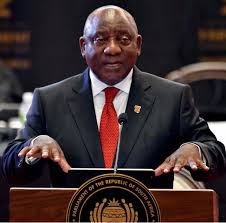President Cyril Ramaphosa has fired back at uMkhonto weSizwe deputy president John Hlophe’s criticism of South Africa’s challenges, accusing him of ignoring the progress South Africa has made since the dawn of democracy.
Ramaphosa was delivering a reply to the presidency budget vote in Parliament on Thursday.
“Yesterday, the Honourable Hlophe gave us a laundry list of everything that is wrong with this country.
Great progress in improving quality of life
“We are alive to the many challenges we face. At the same time, we should not lose sight of the fact that this democracy, only 31 years old, has made great progress in improving the quality of life of its citizens,” said Ramaphosa.
Ramaphosa acknowledged the many challenges the country still faces. But he insisted that real improvements had been made.
He cited electrified homes, clean water supply, public housing, free basic services, a record-breaking matric pass rate, and support from NSFAS as key achievements.
“They wish us to discount the more than 600 000 learners who passed their matric exams last year. The highest recorded pass rate in our country’s democratic history.
“They wish us to not consider the more than 1.2 million young South Africans who are being supported to further their studies by the National Student Financial Aid Scheme,” said Ramaphosa.
NSFAS
He also praised first-time MP Lufefe Mkutu, who had spoken about benefiting from government’s support throughout his schooling to qualify as an industrial engineering graduate.
Responding to Freedom Front Plus leader Pieter Mulder, Ramaphosa said government would engage on the party’s economic proposals.
However, he rejected the use of Carnegie Report on “poor white problem” as useful guide in democratic South Africa.
He noted that the recommendations and findings of the Carnegie Report influenced the development of apartheid.
“The commission sought to uplift the conditions of poor whites, but at the expense of blacks. It proposed separating racial groups in labour and living arrangements. Of extending labour reservation to protect unskilled whites from competition with black labour.
Rejected the Carnegie Report
“And despite what the Carnegie Report said about state aid increasing dependency, the actions of the apartheid state were central to the economic empowerment of whites. Under apartheid laws, blacks were stripped of their land. They were barred from certain occupations, their movement was restricted. And they were unable to build up capital to start businesses,” said Ramaphosa.
He noted the wide differences in resources that were provided to white schools and universities. To white hospitals and clinics, and expenditure for whites. This as compared to blacks on housing, social grants, and agricultural support, amongst others.
He also responded to the criticism about the relationship between government and business. He said collaboration with the private sector is important for job creation.
Ramaphosa said the private sector employs more than 73% of the workers in South Africa. He added that the presidency led the way in fighting load shedding through partnerships under the National Electricity Crisis Committee.
Ramaphosa said there was progress made through investment conferences. And he highlighted that South Africa reached its R1.2-trillion investment goal in 2013 earlier than expected.
He also defended the commissions of inquiry after their value was questioned during the budget vote debate.
Commissions of inquiry
Ramaphosa said the commissions have led to important reforms and recovery of stolen funds.
“Yesterday the Honourable Nolutshungu sought to discredit the processes around commissions of inquiry. He called… them a waste of money and time,” said Ramaphosa.
“I said yesterday and I will repeat again today, as a country committed to the rule of law, to procedural fairness and to transparency, we will ensure that the allegations made around corruption in the upper echelons of the South African Police Service will be fully ventilated in the commission of inquiry process,” he added.



